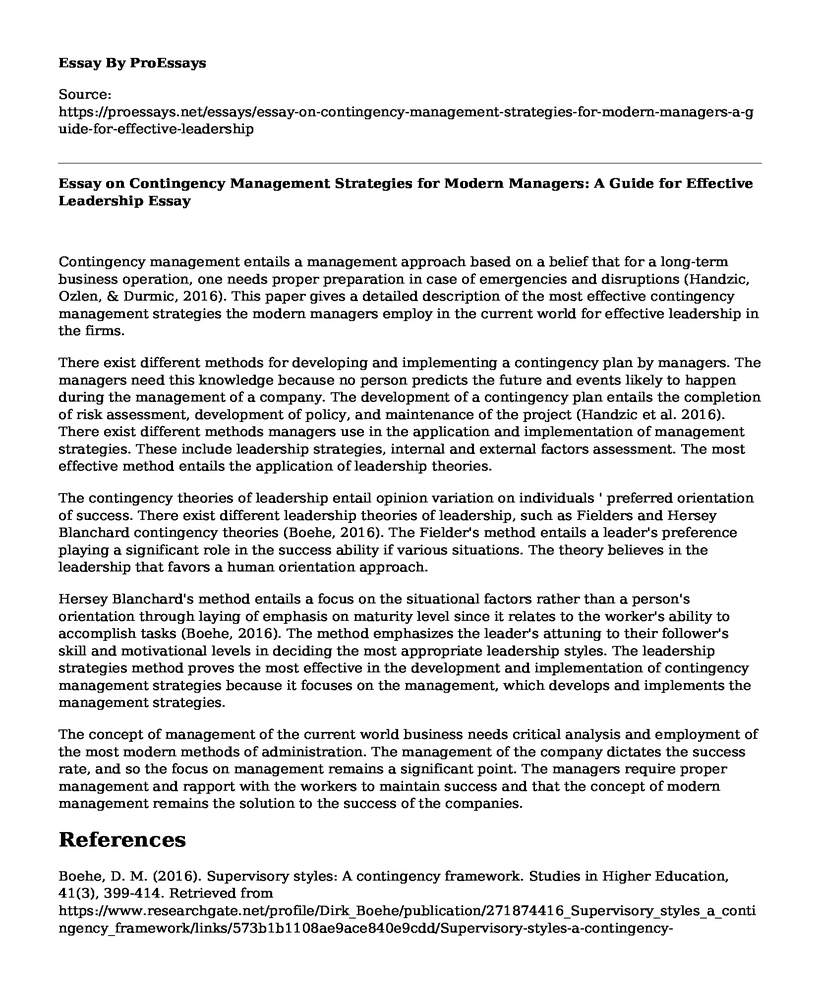Contingency management entails a management approach based on a belief that for a long-term business operation, one needs proper preparation in case of emergencies and disruptions (Handzic, Ozlen, & Durmic, 2016). This paper gives a detailed description of the most effective contingency management strategies the modern managers employ in the current world for effective leadership in the firms.
There exist different methods for developing and implementing a contingency plan by managers. The managers need this knowledge because no person predicts the future and events likely to happen during the management of a company. The development of a contingency plan entails the completion of risk assessment, development of policy, and maintenance of the project (Handzic et al. 2016). There exist different methods managers use in the application and implementation of management strategies. These include leadership strategies, internal and external factors assessment. The most effective method entails the application of leadership theories.
The contingency theories of leadership entail opinion variation on individuals ' preferred orientation of success. There exist different leadership theories of leadership, such as Fielders and Hersey Blanchard contingency theories (Boehe, 2016). The Fielder's method entails a leader's preference playing a significant role in the success ability if various situations. The theory believes in the leadership that favors a human orientation approach.
Hersey Blanchard's method entails a focus on the situational factors rather than a person's orientation through laying of emphasis on maturity level since it relates to the worker's ability to accomplish tasks (Boehe, 2016). The method emphasizes the leader's attuning to their follower's skill and motivational levels in deciding the most appropriate leadership styles. The leadership strategies method proves the most effective in the development and implementation of contingency management strategies because it focuses on the management, which develops and implements the management strategies.
The concept of management of the current world business needs critical analysis and employment of the most modern methods of administration. The management of the company dictates the success rate, and so the focus on management remains a significant point. The managers require proper management and rapport with the workers to maintain success and that the concept of modern management remains the solution to the success of the companies.
References
Boehe, D. M. (2016). Supervisory styles: A contingency framework. Studies in Higher Education, 41(3), 399-414. Retrieved from https://www.researchgate.net/profile/Dirk_Boehe/publication/271874416_Supervisory_styles_a_contingency_framework/links/573b1b1108ae9ace840e9cdd/Supervisory-styles-a-contingency-framework.pdf
Handzic, M., Ozlen, K., & Durmic, N. (2016). A contingency approach to knowledge management: Finding the best fit. International Journal of Knowledge Management (IJKM), 12(1), 31-44. Retrieved from ttps://www.researchgate.net/profile/Muhammed_Oezlen/publication/305451384_A_Contingency_Approahch_to_Knowledge_Management_Finding_the_Best_Fit/links/579e0f8208ae5d5e1e171354/A-Contingency-Approach-to-Knowledge-Management-Finding-the-Best-Fit.pdf
Cite this page
Essay on Contingency Management Strategies for Modern Managers: A Guide for Effective Leadership. (2023, Feb 27). Retrieved from https://proessays.net/essays/essay-on-contingency-management-strategies-for-modern-managers-a-guide-for-effective-leadership
If you are the original author of this essay and no longer wish to have it published on the ProEssays website, please click below to request its removal:
- Setting and Achieving Goals Essay
- Current IT-Related Ethical Issues Essay Example
- Essay Sample on Vital Aspects of Any Company: Vision and Mission Statements
- Essay Example on Leadership in Heartland: Two Offices, Two Leaders, 14 Miles Apart
- Essay Sample on Managing Risk in Business: Cybersecurity, Finance & More
- Essay on Jill's Struggle to Turn Around Club Lido: Challenges of Establishing a Service-Oriented Culture
- Paper Example on Annual Report: Financial Performance & Strategic Plans







